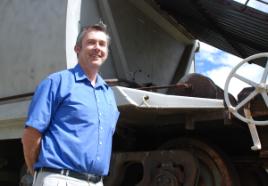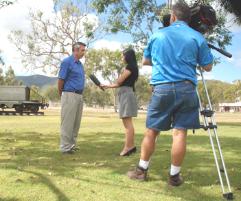Uni welcomes second major Rail Technology Development grant
Published on 28 August, 2008
CQUniversity's Centre for Railway Engineering (CRE) has welcomed a second major grant of $670,000 in funding over 2 years to develop technologies for long freight trains. There's a particular focus on markets such as the coal haulage system in Central Queensland and in the Hunter Valley and the iron ore haulage railways in Western Australia.
The first grant for $869,500 was for the development of an Australian electronic train braking system (OzECP). The project also involves contributions and partnerships with QR and rail system manufacturer, Faiveley Transport. The second grant, $670,000 also recently approved by the Queensland Government's Smart State Research Partnerships program, is for the development of a Train Health Advisory System.

Associate Professor Colin Cole
Faiveley Transport is the perfect industry partner for these programs, bringing extensive skills and experience in the development and industrialisation of leading edge technologies for rollingstock. The company has been involved in the adaptation of similar brake technologies in use in Europe.
CRE Director, Associate Professor Colin Cole said both projects have been developed in partnership with Rail Innovation Australia (RIA), the Rockhampton-based spin-off company established by the Cooperative Research Centre for Railway Engineering and Technologies (Rail CRC) for commercialising the intellectual property developed by the Centre. Dr Cole said the development of an Australian electronic train braking system (OzECP) will have significant benefits to train running block times - of particular interest to the booming minerals market.
"The new braking product will have a lower total life costs, better safety and reliability, and will be easy to install and maintain," he said.
"The adoption of ECP brake technology would allow railway operators to shorten train stopping distances and have longer and heavier trains, thus, increasing capacity of the existing rail network.
"Safety of freight train operations is imperative as trains are getting longer and heavier and train dynamics are becoming more complicated."
Dr Cole said the Train Health Advisory System is a technology that would assist rail operators to improve safety of train operations and reduce the risk of train derailment, promptly identifying and reporting wagon faults such as wheel unloading, dragging equipment, wheel flats and hunting.
"The system also has the capability of giving a daily maintenance and safety report of track, rolling stock and train operations," he said.
"As the conditions of track and rollingstock are known on a daily basis, this exciting technology offers possibilities including an improved focus of maintenance efforts and the achievement of faster line and average speeds where conditions allow.
"Both technologies require a train-wire for power and information transfer and developing the 2 products together will allow a package of options to be offered to railway operators at reduced costs."
Dr Cole said the Rockhampton-based Centre for Railway Engineering provided significant research contributions to both project areas in the Rail CRC.
"It is particularly pleasing for the Centre for Railway Engineering to see research moving from the theoretical stage to commercial products.
"It should be emphasised that these achievements are only possible due to the collaboration of several companies and with contributions of an excellent team of research and development staff, notably, Anna Thomas, General manager Rail Innovation Australia, Mitchell McClanachan Senior Research Engineer, CRE, and Chris Bosomworth, CEO, Insyte Solutions Pty Ltd."


